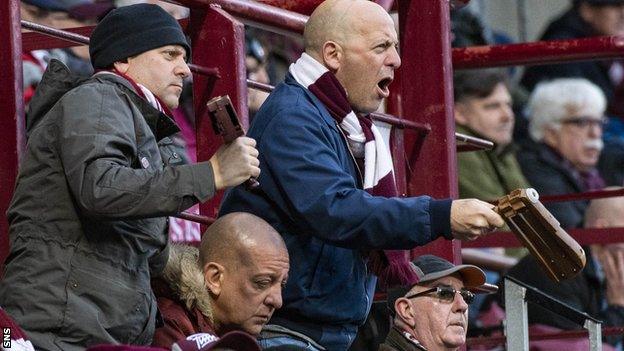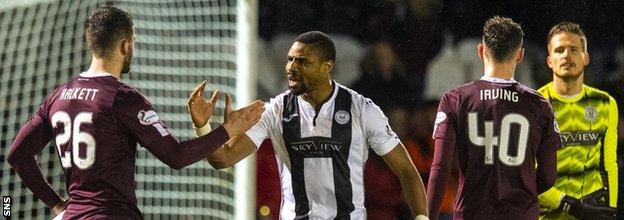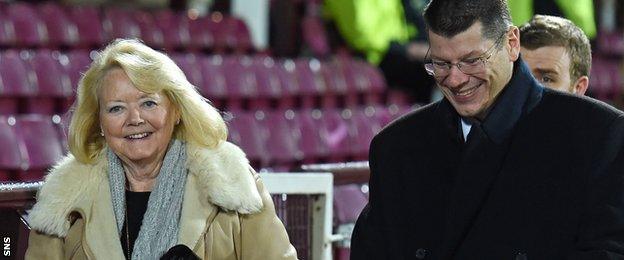'Hearts & Partick Thistle arbitration saga settled, but distrust now rife'
- Published

Hearts fans are angry, but would they have goaded Hibs fans if roles were reversed?
In the DNA of most football fans there is a propensity to bask in the discomfort of others, especially if the others are clubs that have known success then fallen on hard times.
When Celtic almost went to the wall in the 1990s - they should really get busy on that statue to Fergus McCann - there was a sense of exhilaration in other places at their near demise. The media didn't spare them, that's for sure.
When Aberdeen's form fell off a cliff in too many seasons in the 2000s, they could have heard the whooping and hollering carried up on the wind from Glasgow.
Rangers' implosion in 2012, Hearts' administration in 2013, Hibs' relegation in 2014 - fans of other clubs got a lot of gratification from those events. It's the way it is. Tribalism in all its glory.
The outpouring of glee that greeted the arbitration panel's decision to uphold the decision to relegate Hearts - we'll come to Partick Thistle in a second - has to be seen in the same light.
Many football fans would agree that what has happened here is unfair, but they draw the line at empathy because Hearts - like Celtic, Rangers, Aberdeen and Hibs before them - are an open goal, a big club laid low, a free-spending, poor decision-making shambles. Mockery comes with the territory.
The gist seems to be that, no, it's not right that a club is relegated with eight games of a season left to play but, never mind, Hearts deserve to go down in any case. Would the same be said had a smaller club - Hamilton, Ross County or St Mirren - ended up in 12th? Doubtful. The bigger they are, the harder they fall, the greater the mirth when they do.
There are, of course, roaring inconsistencies on all sides throughout all of this. Hearts have been lambasted by fans of other clubs for fighting hard to avoid enforced relegation, but these same fans would want their own club to act in exactly the same way.
Hearts fans taking umbrage at the goading of other supporters would need to acknowledge that had, say, Hibs been demoted in similar circumstances, the hilarity of the situation would not be lost on them. They, too, would have revelled in it.

Defeat at St Mirren in the final domestic game played before lockdown left Hearts bottom of the Scottish Premiership
Thistle are the club that nobody really wants to talk about. The injustice done to them is not so easily dismissed. Two points behind with a game in hand and nine left to play and they're relegated. For them, it's a wretched outcome and everybody knows it.
Hearts' protests can be waved away by their critics because they spent a relative fortune only to fail. Because they won only four games all season, because they recruited badly, because their owner took this to court and lost, because their actions unfairly threatened the promotions of Dundee United, Raith Rovers and Cove Rangers, because their call for compensation could have destroyed many a club had a £10m liability been thrown at them.
But what were they supposed to do? Take it on the chin or fight? The fact that the SPFL executive and its clubs could not come up with a solution that would have seen no team harmed meant chaos was inevitable.
'Scottish football needs to do a whole lot better'
The saga is settled now. That's one blessing, at least. In the first instance, it was brought about by Covid-19, then exacerbated by cack-handed governance and made worse by clubs fighting among themselves about reconstruction. The bitterness and rancour went off the scale. The leadership of the league throughout most of this sorry episode was sadly lacking.
We now have an environment of distrust. During all of this, almost a third of clubs voted for an independent inquiry into the governance of the SPFL board, not just relating to this one issue. No chief executive in any company in the world would want a third of their members calling for a review of how they are performing.
Last week, clubs voted against giving the SPFL board the power to decide the outcome of the coming season if it is hit by a second wave of coronavirus. On Monday, Aberdeen chairman, Dave Cormack, spoke about the need for a constructive review of the way Scottish football does business.
"I don't know what the vision is," he said. "We don't have a branding strategy. At the centre we've got an administration that is not run like a real company that would have vision and a branding strategy to generate more income."
If you want to portray this as one or two clubs, fuelled by self-interest, crusading against the SPFL then you can. But it's not true. Cormack speaks for many. Even those chairmen and chief executives and managing directors who were critical of the way Hearts reacted to demotion largely agree that Scottish football needs to do a whole lot better in many different areas.
A whole swathe of people agree on that. Better on communication, better on commerce, better on promotion, better on working together. Saying it is one thing but delivering on it is another, of course.
Most, if not all clubs, believe that the SPFL, still without a title sponsor 11 months after being told that Ladbrokes would not be renewing the deal, can and should be delivering more. The clubs want change, in theory. In reality, they protect the voting structure that regularly stymies that change.
'Fighting talk does not help heal wounds'

Hearts chair Ann Budge criticised the 'self-congratulatory statement' released by Neil Doncaster's SPFL
Neil Doncaster, the SPFL chief executive, had every right to feel relieved at the outcome of the arbitration hearing, but talking of how "delighted" he was "that our approach has been vindicated" was not exactly a move designed to heal the rifts that now exist. Conciliatory, it was not.
For sure, Doncaster and his executive won the day. A unanimous verdict from three QCs is a big deal. Without doubt, the board have been beaten up by the events of the past three months.
In his moment of victory, he chose to throw his arms in the air in celebration rather than trying to throw them around the defeated clubs in an attempt to rebuild relationships. Many might argue that he was perfectly entitled to celebrate - defeat might have seen the end of him in the role - but his words haven't helped the healing process, as was evident in the reaction from Hearts and Partick Thistle.
It was fiery, to put it mildly, a continuation of the polarisation. Ann Budge spoke about how Hearts' relegation could only be described as "shameful... as indeed should the SPFL's self-congratulatory statement." She said that though Hearts had lost the battle "it is winning the war that counts".
That did not suggest that the club's fight to change the SPFL is over. Budge's counterpart at Firhill, Jacqui Low, went even further. "I ask everyone associated with Thistle to never forget today. To never forget how it feels to be relegated unfairly. To never forget that there are many decent people and clubs in Scotland who stood with us publicly and privately - but there are some whose fear and self-interest go in the way of doing the right thing."
Like Doncaster's air of triumphalism, fighting talk of that kind does not help to heal wounds. Already, Bill Clark of Raith Rovers has pulled them up on this. "Are we not decent people? Are we bad people?" he asked on the BBC's Scottish football podcast.
The decision has been made and everybody has to live with it. On Saturday we will at last celebrate the return of the brilliant obsession that is league football, but the fallout from this vexed affair will linger.